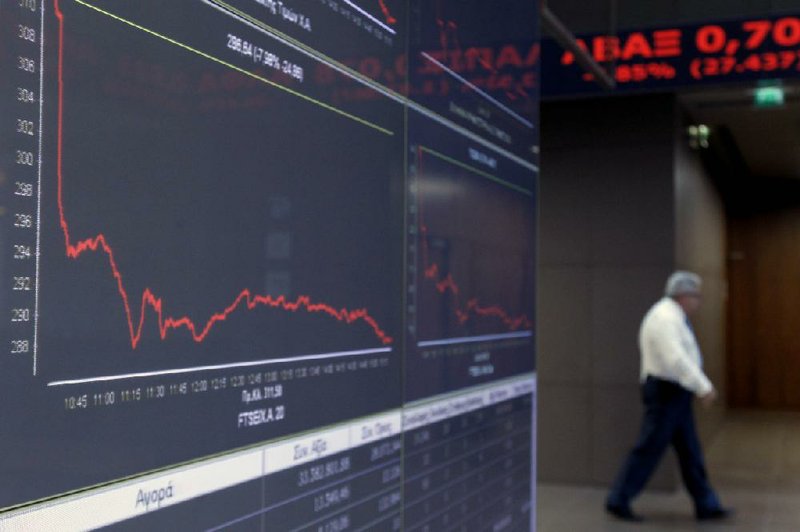ATHENS, Greece — Shares in Greek banks plunged on the Athens Stock Exchange Monday amid expectations they will have to accept higher than agreed losses on the country’s government bonds as part of a new eurozone debt deal.
Greek banks hold billions in the country’s government debt, and investors fear they will be unable to withstand losses on the bonds without some form of state support.
Bank stocks closed on average nearly 17 percent lower on Monday, pulling the exchange’s general index down 4.51 percent to 747.08. Other European stock indexes were buoyed by the prospect of a debt agreement.
Leaders of the 17-nation eurozone, fearing the crisis could spread from debtshackled countries such as Greece to larger economies, failed to clinch a comprehensive debt deal at a weekend summit in Brussels. They expect to finalize an agreement by Wednesday.
Greece’s rescue lenders — other eurozone countries and the International Monetary Fund — warned in a report this month that the course of the country’s national debt remains “extremely worrying,” blaming delays in privatizations and the implementation of long-term changes. It said that a July 21 European debt agreement, seeking voluntary losses for Greek bondholders of about 20 percent, may “not suffice.”
“The report says ... that the Greek debt under these circumstances is not sustainable,” Development Minister Michalis Chrysohoidis told private Skai radio Monday. “Unfortunately, the decisions taken on July 21 were not the end ... but the beginning.”
A report from Greece’s debt inspectors has suggested that the value of the bonds may need to be reduced as much as 60 percent.
Greece has been surviving on a $150 billion rescue-loan program after being frozen out of bond markets last year by inordinately high interest rates. The interest rate on 10-year Greek bonds stands at nearly 25 percent, compared with the benchmark German rate of just over 2 percent.
The 2-year financial crisis has hammered Greek banks. Shares in the country’s largest lender by assets, National Bank of Greece, have tumbled from more than $28 in October 2009 to just $2.50 Monday.
“There is no prospect of revival in Greece until and unless Europe gets its act together,” financial analyst Yannis Varoufakis said. “Greece will have to wait in this comatose state, zombified state, until Europe collapses or fixes its problems.”
Expecting a fourth year of recession in 2012, the country is suffering from a rapid rise in unemployment — now at 16.5 percent — and a drop in living standards.
The eurozone bailout fund will see its firepower increased to more than $1.39 trillion to enable it to contain the debt turmoil that threatens to rip apart the 17-nation eurozone, according to German lawmakers briefed Monday by Chancellor Angela Merkel.
Eurozone governments hope the $600 billion European Financial Stability Fund will be able to protect countries such as Italy and Spain from being engulfed in the debt crisis.
To do that, however, it needs to be bigger or see its lending powers magnified.
Frank-Walter Steinmeier, parliamentary leader of the opposition Social Democrats, and Greens leaders Cem Oezdemir and Juergen Trittin said the chancellor informed them that the fund’s lending powers will be increased significantly.
“There will be a leveraging of the [fund]. It is clear that this leveraging will be around a level beyond [$1.39 trillion],” Trittin told reporters outside the chancellery in Berlin.
Italian Premier Silvio Berlusconi lashed out Monday at his German and French counterparts who have demanded Italy introduce new measures to spur economic growth, chiding them for trying to “give lessons” to Rome and insisting Italy’s economy was stable.
Berlusconi’s pointedly critical statement came as he summoned his Cabinet for an emergency meeting to discuss growth measures the European Union has demanded so that Italy doesn’t get further dragged into Europe’s debt crisis.
The EU wants Italy to overhaul its labor markets and its inefficient judicial system, considered a main impediment to foreign investment. But Italy’s bickering political parties have suffered a near-paralysis when it comes to making substantive structural changes.
Over the weekend, French President Nicolas Sarkozy and Merkel issued stern warnings to Berlusconi.
Berlusconi, however, bristled at the criticism, saying Italy was already taking measures to cut its public debt and balance its budget by 2013. “No one in the EU can nominate themselves commissioner and speak in the name of elected governments,” he said. “No one can give lessons to EU partners.”
England’s Prime Minister David Cameron pleaded with Conservative Party lawmakers on Monday to drop their support for a national referendum on Britain leaving the European Union, comparing the bloc and its economic crisis to a house on fire that needs everyone’s help.
Information for this article was contributed by Derek Gatopoulos and Nebi Qena, Nicole Winfield, Juergen Baetz, Melissa Eddy and Cassandra Vinograd of The Associated Press.
Business, Pages 21 on 10/25/2011
